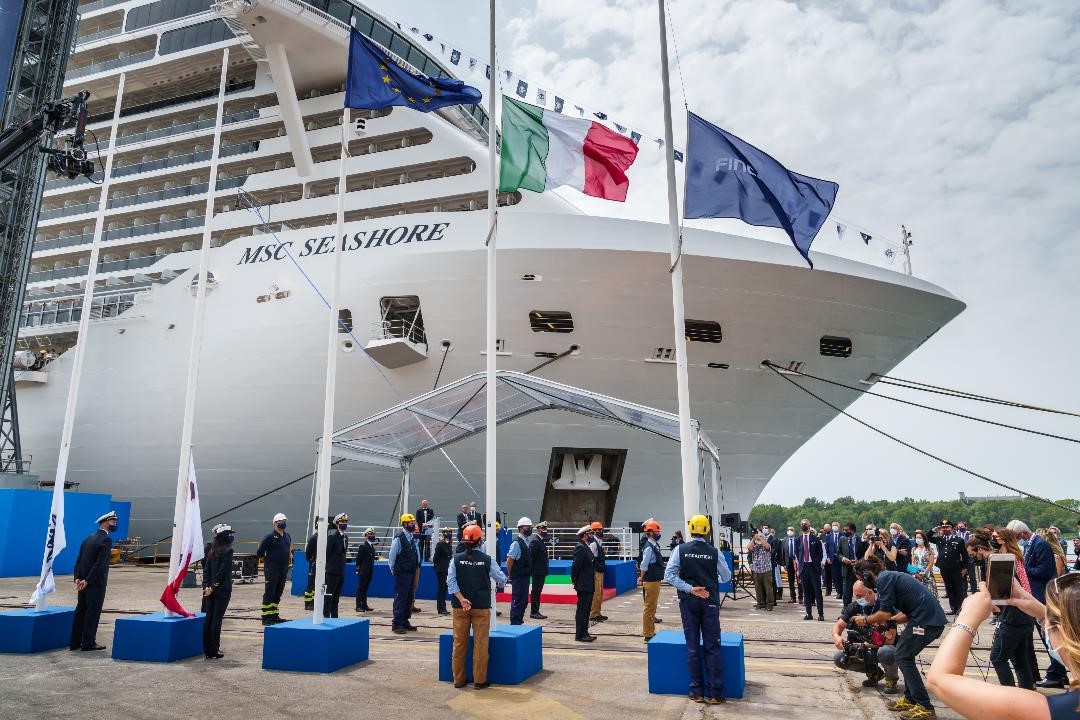MSC SEASHORE DELIVERED WITH THORDON’S COMPAC AS MORE CRUISE SHIPS EMBRACE SEAWATER LUBRICATED SHAFT LINES
The largest cruise ship to be built in Italy has been delivered with a COMPAC seawater lubricated propeller shaft system from Canada’s Thordon Bearings.
The 170,400gt MSC Seashore, delivered from Fincantieri’s Monfalcone shipyard late last month, joins the smaller 154,000gt Seaside-class vessels MSC Seaside and MSC Seaview, both of which were delivered with a COMPAC bearing system in 2017 and 2018 respectively.
Anna Galoni, CEO, Thordon Bearings, said: “As the sector resumes service after a tumultuous 18 months, we congratulate MSC Cruises and Fincantieri on the successful and timely delivery of this very impressive new flagship.
“MSC Seashore, the cruise line’s first Evo-class cruise ship, sets the benchmark in environmentally sustainable cruising. We are obviously delighted that both owner and builder continue to support the use of seawater lubricated propulsion as a way of meeting clean shipping objectives.”
In addition to a COMPAC shaft line, MSC Seashore is fitted with an array of advanced technology designed to reduce the impact of operations on the marine environment.
This includes a hybrid exhaust gas cleaning system and a Selective Catalytic Reduction (SCR) system to reduce NOx by 90%. MSC Seashore is also designed to meet the requirements of classification society RINA’s ‘Biosafe Ship’ and ‘Sustainable Ship’ notations.
George Morrison, Thordon’s Regional Manager, EMEA & ANZ, said: “MSC Cruises and Fincantieri have not only presented the largest ship ever to be built in Italy, but also one of the sector’s most advanced ‘green’ ships. The COMPAC system is a significant contributor to perhaps the most ecological, eco-friendly cruise ships built to date. MSC Seashore represents a cruise industry milestone.”
Thordon Bearings has noted a sharp rise in cruise industry orders for COMPAC over recent months.
The system has been selected for another four 64,000gt vessels Fincantieri is building for MSC Cruises, and the technology has been proposed for MSC Seascape, a second Evo-class ship, though supply contracts have yet to be finalized.
Regent Seven Seas, Viking Ocean Cruises and Princess Cruises are others to have recently specified COMPAC for newbuilds slated for delivery over the next 24 months.
Commenting on the sector’s adoption of the technology, Craig Carter, Thordon Bearings’ Director of Marketing & Customer Service, said several cruise operators now favour a conventional shaft line over a podded propulsion arrangement.
“Aside from the obvious environmental and financial benefits of conventional shafts lubricated by seawater, I think a lot of owners are beginning to tire of the pod’s well publicized reliability issues and high maintenance contract requirements.
“With a conventional shaft line, cruise lines know they are operating tried and tested technology relied upon to get the ship through a season. In more than twenty years of COMPAC, we have never seen a cruise canceled or had to revise an itinerary due to problems with a seawater lubricated propeller shaft bearing and there is minimal maintenance required – which is why we are seeing an uptick in orders.”


